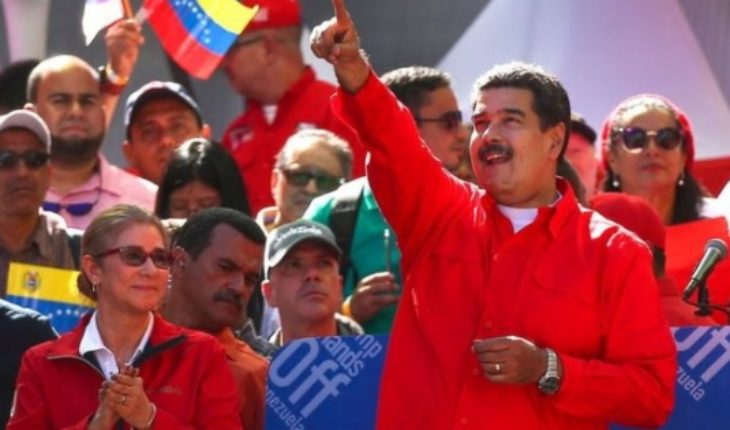the sanctions imposed by Donald Trump let to Venezuela without its main trading partner: United States.
The North American country is the target of 42 percent of Venezuelan exports and the origin of 38% of imports, according to data from the Observatory of economic complexity 2017.
Now, penalties placed on PDVSA, the State oil company, pose a major challenge for the Government of Nicolas Maduro, as sales of crude oil abroad contribute 90% of revenues from Venezuela and 41% had as a buyer to us, at least until 2017.
Caracas has long trying to diversify its customer base and go for other products to rely less of who was his business partner, but enemy politician; as well as the ups and downs of the price of oil, which has been years down.
However, less than two months that the sanctions become effective, more countries will close the door to trade with Venezuela for fear of being affected by them.
Meanwhile, the world sees how Venezuela tries to continue to participate in the global economy, but without being able to clear the doubt what will happen to his already weakened economy over the coming months and what impact will this decline in politically.
From Lisbon to Moscow after that United States block at the end of January the assets that PDVSA has within its territory, Caracas has taken steps so that this will not be repeated elsewhere.
CITGO, a subsidiary of PDVSA in the United States, was one of the most valuable jewels of the country. With the loss of their control, the Venezuelan Government has run out of to handle $7,000 million in assets and $11,000 million that had generated its activity this year, according to estimates by John Bolton, United States National Security Advisor.
To avoid this to be replicated in Europe, where many countries of the European Union do not recognize Maduro as President to Juan Guaidó, Caracas, Venezuela but ordered the week passed the European headquarters of PDVSA, in Lisbon, moving to a safer port : Moscow.
“Europe does not give guarantees of respect to our assets,” said the Vice President of Venezuela, Delcy Rodríguez, making the announcement. Russia, a political and commercial partner of Venezuela, defends the legitimacy of Maduro as President and condemns self-proclamation of guided as”President” of the country.
“The capitalist world itself violates its own laws,” said Rodriguez, who gave as an example to Citgo, which he said, “was snatched by the Government of the United States”.
He also referred to the Bank of England, which according to her “is running with the gold of Venezuela”. The Venezuelan Executive says this entidadrehusa give part of gold which is stored in it. The Bank did not want to deny or affirm this accusation.
To what she considered an “armed robbery”, the Government has decided to “strengthen” the energy cooperation with Russia”through this transfer.
But, what is this change of venue for PDVSA?
According to the American company specializing in intelligence Stratfor, Venezuela may now move to PDVSA staff and documents of the company to a place where they would be “out of the scope of European investigators and prosecutors” as well as of the sanctions Americans.
On the other hand, for the Norwegian consultancy Rystad Energy petroleum sector analyst, Paola Rodriguez-Masiu, this transfer “does not bring any benefit and has little sense” “logic that is behind is: Venezuela is afraid to pass the Citgo, whose assets were” frozen and passed to guided”, as he said to the BBC.
The Indian route sales of Venezuelan crude oil to the United States were at their lowest point in 30 years, according to data from the Refinitiv financial analysis service. But even so, the loss of the North American country as a customer is a stumbling block for the Venezuelan economy that it is not known whether you can retrieve.
At the moment, the reaction of the Government has been trying to redirect this oil to its second biggest buyer: India.
Between January (when the sanctions were announced) and February, exports of Venezuelan oil to India increased in at least 31%.
“I don’t know if it is the fastest growing there, but what is certain is that in February India was the biggest buyer of Venezuelan oil”, said BBC World Center research analyst Wilson Center, Hari Seshasayee. “Depending on the sources you consult, India bought between 500,000 and 600,000 barrels per day from Venezuela”.
The Southest nation is the third largest buyer of crude oil in the world. As Seshasayee points out in a recent report by the Wilson Center, the growth of its economy in the 21st century (an average of 7.5 per cent during the first decade) generated a great demand for fuel for transport, industry and households.
Only between 2005 and 2013, India doubled its imports of oil, so it is not surprising that it has finished including Venezuela among its suppliers despite the few bonds that unite both Nations.
Still, Francisco Ibarra, director of Venezuelan Econometrica, believes that finding new customers for the oil that U.S. will not be an easy task.
“The majority of refineries are not made for Venezuelan crude oil, which has a high sulfur content,” he said to the BBC.
Venezuela owes money to China and Russia, traditional allies, so an increase in the sale of oil to these countries would not bring new revenue but that would be a payment of debt. USA was a buyer who paid on time and a good price, recalled Ibarra, he considered that PDVSA now has “a monumental challenge”.
“It is not as easy as selling to another. You have to create the demand.” If it were easy to find new markets, Venezuela would have stopped trading with US some time, added.
The india option is also uncertain. Seshasayee believes that it will only work in the short term because the increase is due to that Venezuela is offering “with a big discount” oil to two refineries that buy you: the Indian giant Reliance Industries and Nayara Energy, owned by State oil company Russian Rosneft.
For him, the experience of what happened with the sanctions imposed against Iran is “important”.
“Reliance buying you much petroleum to Iran, stopped almost all purchases this country… I believe that if U.S. pressure, they will stop purchasing to Venezuela, especially Reliance, which has many interests related to United States,”he said.
“Reliance will continue to buying to Venezuela, but only while they continue without being affected by sanctions”, concluded.
Paola Rodriguez-Masiu recalled that another option which is not bearing fruit which was taken before the first sanctions imposed by US, when Venezuela resorted to a strategy of “triangulizacion”, which consists of selling crude oil to an intermediary (“trader “) who was in charge of marketing it.” The problem is that there are now more difficult to find traders willing to work with Venezuela.” Although sanctions do not relapse, in theory, companies that are not American, foreign refiners fear that in the future they will expand and affect them.”
“traders” are not prohibited from negotiating with Venezuela unless they are of U.S. origin, told BBC News the expert in Latin America of analysis and economic forecasting company Oxford Economics, Carlos de Sousa.
Another reason that may not want to trade with Caracas is the desire to “prevent ‘reputational’ risk of negotiating with Venezuela, but it is not a legal risk, for now”.
Sell gold before the price fall suffered by the oil in recent years, the Venezuelan Government strong opted to a second source of income: gold.
“The commitment to sell gold is nothing new. Last year, Venezuela sold $900 million in gold only to Turkey”, said De Sousa.
U.S. and other Western countries have warned countries that they buy Venezuelan gold of possible consequences.
In addition to Turkey, much of this gold was acquired by the United Arab Emirates (USA), but after these pressures, this country’s investment firm Noor Capital announced in early February that it would refrain from making future transactions with Venezuela until its situation to stabilize. And this despite the fact that, as he recalled the company, buy Venezuelan gold is not “an illegal or prohibited operation”.
Turkey, however, has failed to signal still give in to this pressure.
De Sousa, he pointed out that the gold sold so far was not monetary, i.e., that it did not belong to the Central Bank of Venezuela and that, therefore, it was not part of the country’s reserves.
“The regime will surely try to sell monetary gold from central bank, but the threat of US penalise financial institutions that buy this gold much limits the number of potential customers,” added the expert.
“In any case, it is impossible for the regime to offset the fall in oil sales. The reduction in oil exports will amount to $20,000 million this year due to the effect of sanctions, the fall Chronicle of production and lower oil prices”.





